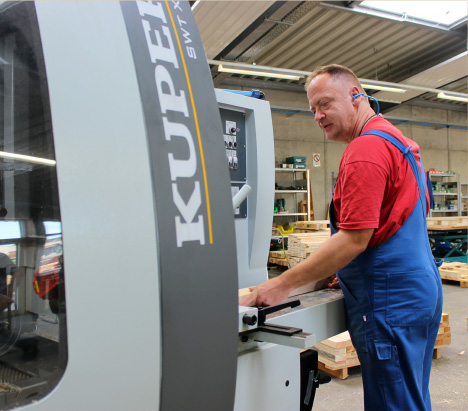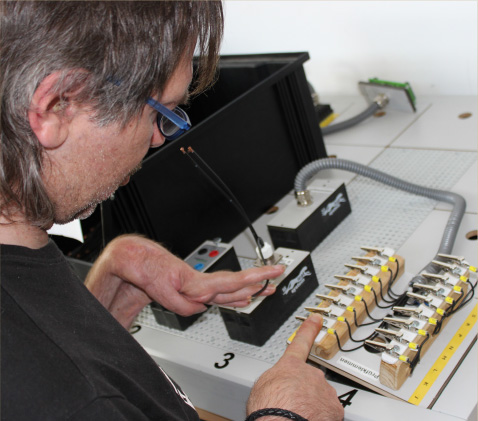Economy and inclusion – no off-limits topic
In Afferde, a small village on the outskirts of Hameln, 2001
the Paritätische Lebenshilfe (PLSW) with its industrial service.
It provides jobs for people subject to social insurance contributions
with mental or psychological limitations.
The first impression when you drive through the gate is friendly and inviting. The terrain is easy to overlook and its layout is based on easy orientation. The roofs of the buildings are conspicuous. One could almost think that a giant would have simply placed them the other way round on the buildings. The complex is lined by meticulously cut green areas and lovingly maintained flower beds.

It is just breakfast break and many of the employees enjoy the still warm autumn sun on the many seats in front of the workshops. Curious and friendly one looks at newcomers. There are no fears of contact here. An employee immediately approaches you and asks you what your name is and what you are doing here. Variety is always welcome. Everybody is proud of his activity and his own work station. So you are taken directly into the production rooms. We like to explain what the tasks and processes are. Sandra*, for example, assembles insect hotels for a well-known company. Lea* is a cleaning fairy in the room maintenance team. Bernd*, on the other hand, prefers it technical and screws components together for us, the company Schubs. Many of the work areas were created to meet the needs of industry, trade and commerce.
“We are very grateful that our work is is taken seriously
Helmut Waber, Plant manager
and seen with appreciation!”
However, the talents of the employees have also been recognised for the internal use and new jobs have been created, such as sales at the in-house kiosk, room maintenance or kitchen management. Fortunately, the company doesn’t have to advertise its services much, as its good quality of work and on-time deliveries are spreading the word. On a tour of the site it quickly becomes clear that PLSW’s motto “Close to people” is taken very literally. All employees greet joyfully and small jokes are exchanged.
The interaction with each other is very familiar, characterized by trust and cordiality.

The remarkable consistency of the permanent staff and the employees certainly plays a major role. They appreciate the good cooperation and so celebrate big anniversaries with festive honours. “We have even had employees celebrating their fiftieth anniversary with us. As if ordered, an older gentleman shuffles by at that moment, actually a pensioner, as he says. But because of the high feel-good factor, the alumni also return to the workshops again and again.
In the early days of the Paritätische Lebenshilfe it was quickly recognised that not only basic needs such as care and accommodation are important for the residents. Inclusion also plays an important role because it promotes and supports the development of social and communicative skills. In addition, people are integrated into social security systems. An important and reassuring aspect for the relatives.
This will at least eliminate the agonizing concern for the care of their children in the future. The introduction into the working life has a high value with the PLSW. Thus the coworkers go through qualification measures of up to 2 years. For the training of the coworkers exclusively qualified personnel is used such as skilled workers, master craftsmen or technicians with specialeducational auxiliary training. In addition, social pedagogues, therapists, nurses and doctors support successful integration. Only qualified personnel such as skilled workers, master craftsmen or technicians with special pedagogical additional training are used to train the employees. In addition, social pedagogues, therapists, nurses and doctors support successful integration.
The PLSW gives companies from the business sector a hand at another level as well

But how are parity services actually anchored in society? The ideal shows a society that lives social justice and solidarity, that commits itself to share the right of every human being to equal opportunities for realization, including the dignity and development of one’s own personality. It is also possible to bring a so-called external group into one’s own business. This is accompanied and led by a PLSW responsible person.
The internal ‘Company Integration Management’, or BIM for short, even allows individual employees to complete internships in companies in the primary labour market, which can also be extended to an outsourced job if desired. “Surely many companies are unsettled by the unknown dimension “disability”.
This makes it all the more important to break down prejudices and build bridges. That is why we are happy when interested companies want to visit us. So you can convince yourself of our work and the many possibilities – most of them don’t bite here either”, Mr. Waber winked.
* To protect the employees in care and their relatives, all names are fictitious.
